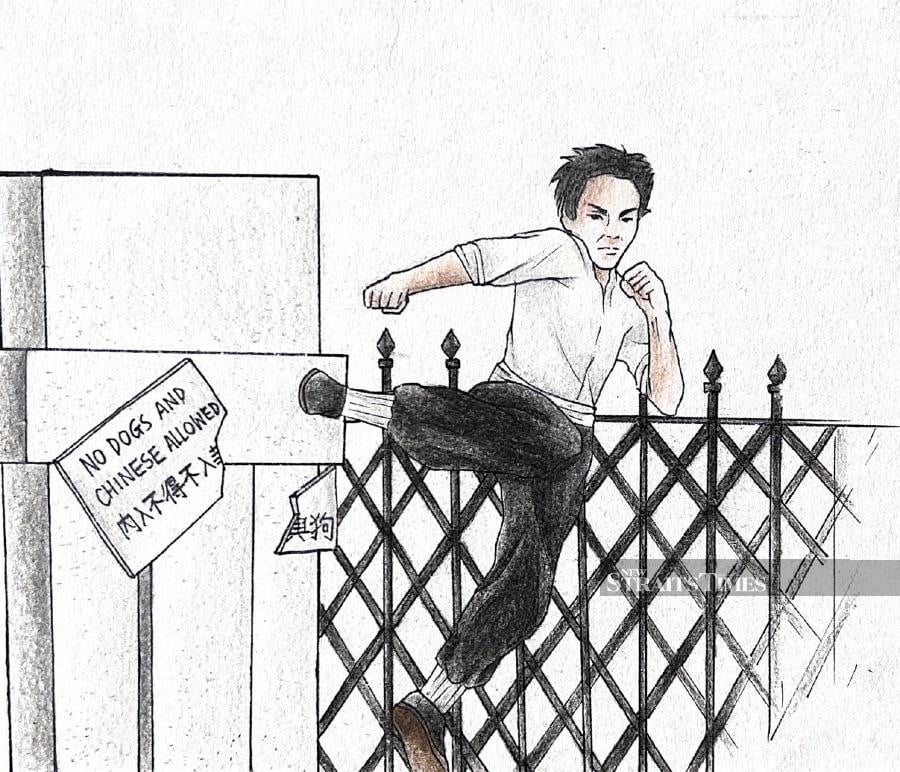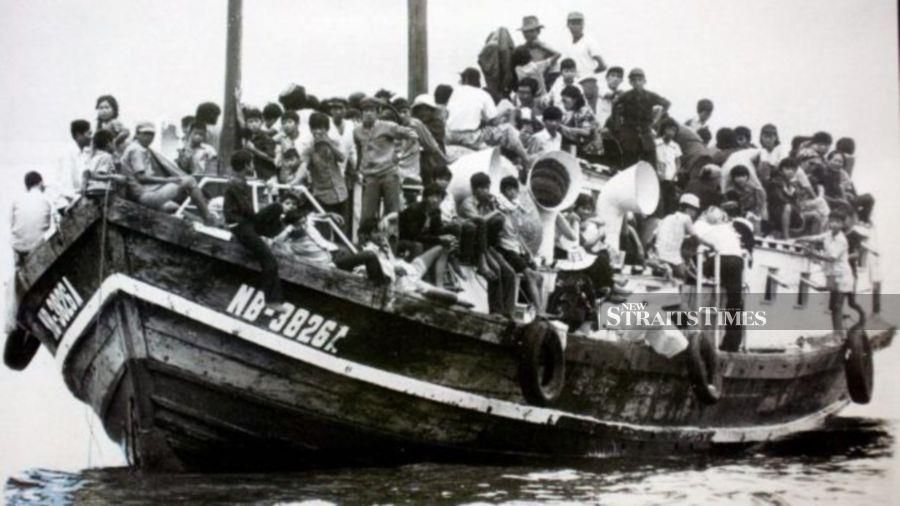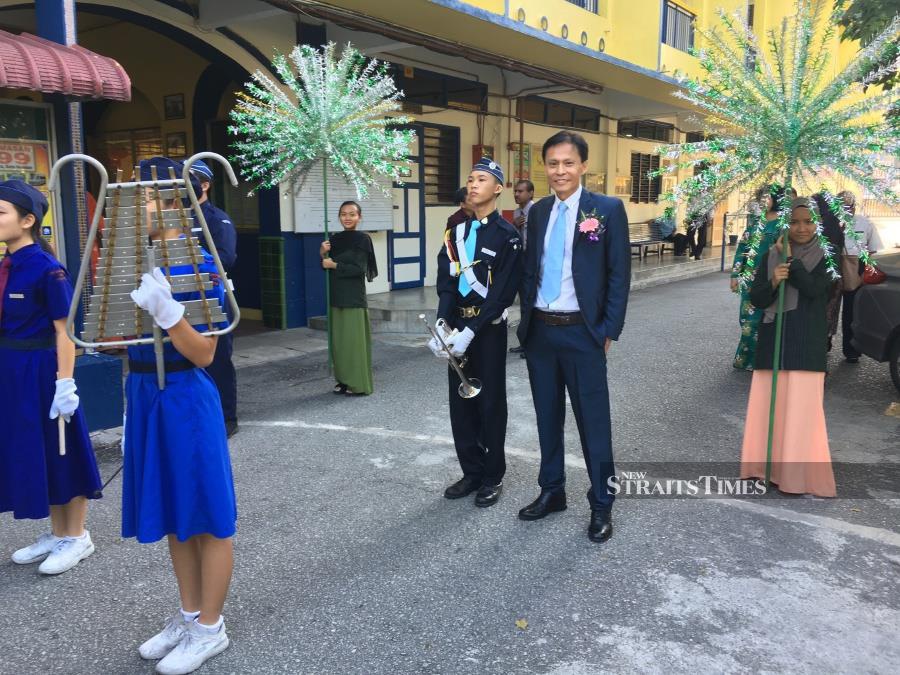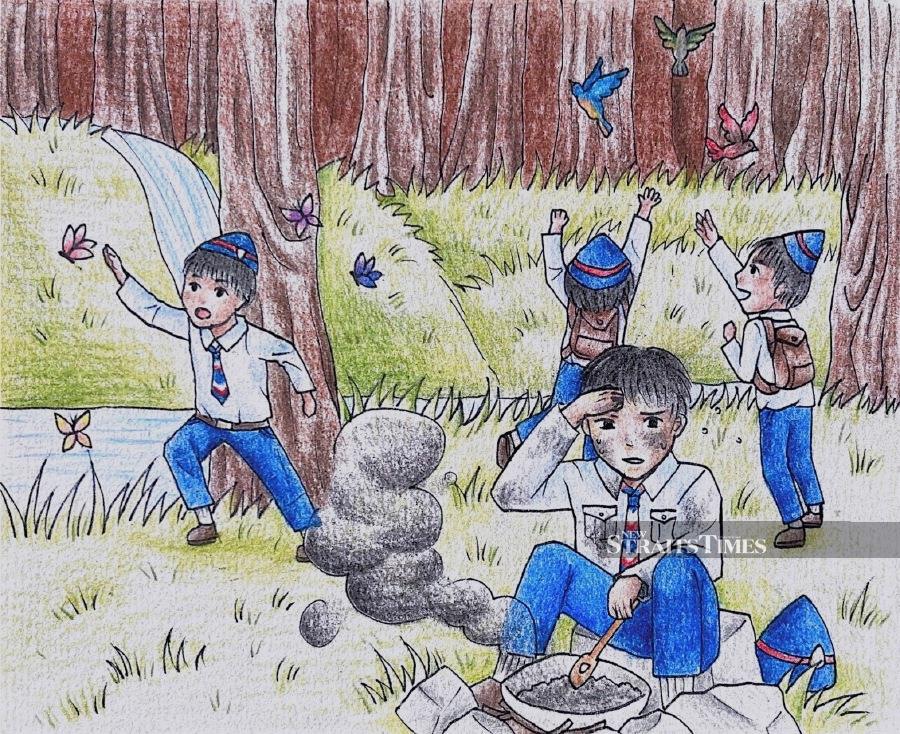"1,2,3, jump! 1,2,3, jump!" I was attempting to touch our kitchen's ceiling lamp, desperately hoping to grow taller as I was among the shortest in class.
One day, I managed to do it. In the excitement, however, I hit the lamp with such force that it broke into pieces.
Luckily, they didn't land on my head though some pieces did fall into the pot of groundnut root soup. It was okay as I didn't need to drink it anymore. I'd finally started to grow taller.
When I began my first day of Form One at ACS Secondary School in Kampar in 1972, I'd realised, to my horror, that all my classmates had overtaken me in terms of height.
After the long year-end holidays, everyone seemed to have grown bigger and taller except me.
Their voices had also become deeper. Some of them were even sporting moustaches too. I was like a kid in a class of adults.
Intimidated, I resolved to catch up with them. That was when I started jumping every day. My mother helped me by boiling her special concoction of groundnut roots.
Thankfully, within a year, I grew so fast that I had to get new shirts and pants that were two sizes bigger. I wondered whether it was nature or nurture, but whatever it was, I was glad to finally be tall enough to join the school volleyball team.
ACS was lucky as our classrooms overlooked the adjacent padang or field. We had a window seat to all the soccer games and events happening there. We also had fun playing soccer every day.
Malaysian soccer was at its pinnacle then. Our national team even beat South Korea, Japan and even the United States during the Olympics. Our heroes were then Soh Chin Aun, Mohktar Dahari and R. Arumugam.
However, the padang had also seen some unspeakable atrocities. During the invasion of Malaya during the Second War War, the Japanese carried out when was known as Sook Ching, or purge, resulting in the deaths of innocent thousands.
Decapitations and water tortures were reportedly also carried out in our school compound, which served as their headquarters.
During overnight camps, our junior scouts dared not visit the toilet at night for fear of ghost sightings.
JOYS OF SCOUTING

The two most popular uniformed groups then were the Scouts and Boys' Brigade (B.B.).
I joined the Scouts while my brother, Wai, joined B.B. Our scout troop was led by an inspiring scoutmaster, Mr Toh. A former King Scout, he was exemplary in his leadership.
Scouting provided us with a thrilling mix of exciting outdoor adventures and appreciation of nature.
We'd happily go round studying the abundant flora and fauna in the Kinta Valley. We also chased after the various fascinating species of birds and butterflies.
My first camping experience beside the Kampar waterfall was a fascinating one. We learnt to cook and survive in the jungle.
On the last evening, it was my turn to cook rice. Unfortunately, my rice turned black and smoky. My patrol leader thought our tent had caught fire and rushed over with a big pail of water.
We ended up eating instant noodles for the night as our last ration of rice had run out.
Every morning, we'd wake up to the singing of magpies and dancing of butterflies. The jungle air was cool and fresh. During the night, a thick layer of mist would cover our tents and we could hardly see the neighbouring tents.
Some of my fellow scouts swore they heard a tiger prowling around. It turned out to be our dear scoutmaster checking on us and wishing us "good night".

Sometimes, we'd find ourselves unable to sleep so we would tell each other ghost stories. The aim was more to frighten than to entertain!
The stories would continue until our patrol leader poked his head into our tent. With his torch shining on his face in the silence of the night, he was quite a sight. He'd threaten us with extra chores and push-ups if we didn't shut up and sleep.
The last night was the campfire — the highlight of the camp. We played interesting games and sang many songs. Our troop leader taught us various national songs and dances he learnt from the Tokyo Jamboree he attended.
Our scout troop was doing well until tragedy struck one day.
One of my fellow scouts in Form One accidentally fell on the way to the waterfall during one outing. Sadly, he injured himself badly and succumbed to his internal injuries.
I recall that he was a friendly student who always topped every examination. It was tragic for such a young and promising talent to be extinguished so early in life. We were all heart-broken.
My friend's death cast a pall over the school and, in particular, our scout troop. Our scout master was devastated. The following year, Mr Toh asked for a transfer to another school and our troop went downhill thereafter. Many of my fellow scouts left the troop and some joined the B.B.
CHANGING TIMES

Led by Mr Tham Leong, a capable and dedicated teacher, the B.B. band would practise its synchronised marching at the padang in their smart attire every weekend.
I recall my brother, Wai, busy polishing his badges with his Brasso, a metal polish, every day at home.
While the air in the padang was filled with music, the air in our house smelled of Brasso!
I'm glad my brother and I joined the uniformed groups. It helped to instil a certain discipline in us during our formative years. Wai's love for B.B. inspired him to join the Royal Air Force later.
Unfortunately, Wai also met with an early tragedy and passed away at 30. It was painful to see my grief-stricken mother crying and pining over him for years.
The early 70s was a tumultuous time. The hippie or "flower power" movement was at its height.
Many boys sported long hair and bell-bottomed pants. Some of them even experimented with drugs. Everyone was waving the "V" sign for peace. Ironically, Winston Churchill used it in a time of war, the V for victory sign one of the defining images of World War Two. I wonder often why girls nowadays flash the "V" sign during photo-taking. Is it for peace or war?
Both our principal and the discipline master were busy dealing with discipline problems. The latter was a huge man with a big belly and a round face. He resembled the character in Kungfu Panda but he had a black belt in judo so no one dared to mess with him.

Our principal, Mr Kong, was nicknamed "King Kong". Public canings were common then. He'd walk around the school with a pair of scissors in his hand. Any boy caught with long hair was given a free haircut on the spot. Those caught with bell-bottomed pants were asked to go home and change.
OF BRUCE LEE AND FAVOURITE SUBJECTS

Besides his punishments, Mr Kong also knew how to entertain us.
He rented TV sets for everyone to enjoy the live telecast of boxing fights in school. Call this either his soft or sadistic side, it was a field day for boys like us.
I vividly remember Muhammad Ali and his famous flowery boast: "Floats like a butterfly, stings like a bee!"
Some of his best and most brutal fights were against George Foreman and Joe Frazier. Especially memorable was Ali's fight against Joe Bugner in Kuala Lumpur in 1975.
The unintended consequence of Mr Kong's generosity was "gladiatorship" among some students. They staged fights with some placing bets too.
At home, I also boxed with Wai using small pillows as gloves. Luckily, apart from some minor cuts, there were no serious injuries.
The early 70s was also a period synonymous with kung fu. There was even a popular song called Kung Fu Fighting.
Bruce Lee was then at his prime and his movies were popular worldwide. He mesmerised us with his trademark two finger push-ups and lightning punches.
I still recall his famous "flying kick" which brought down the infamous "No Dogs and Chinese allowed" sign at a Shanghai park in the movie Fist of Fury.
It was a reminder of the century of humiliation suffered by the Chinese. It's a pity that a rare Asian talent like him died so young.
In school, I was fascinated by the magical world of chemistry.
At home, I tried making "hydrogen bombs" by mixing vinegar with some metal parts. My mother often complained of her vanishing vinegar while my father puzzled over missing items from his toolbox.
However, I abhorred English classes. I was often picked on by my English teacher for my poor grasp of the language. This spurred me to polish up my command of English later.
Our PE class was the most memorable. During rainy days, our teacher, the late Chye Kooi Loong, would tell jokes and regale us with stories of the Battle of Kampar during the war.
An avid historian, Mr Chye spent a lifetime documenting this important battle in his book.
The most boring subject for me was Geography. Some days, I'd sneak out of class and hide in a corner of the library to read the Life magazine.
Looking at its colourful pictures, I'd dream and allow myself to be carried away to far-flung corners of the world. Looking back, I was indulging in escapism to help me deal with the harsh realities of life.
EVENTS UNFOLD

From Life magazine and newspapers, I recall the horrific images of the victims of napalm bombs and Agent Orange, the result of American bombings during the Vietnam War.
I also remember the images of desperate "boat people" after the fall of Saigon in 1975. Sadly, thousands of them perished in the high seas. Not long after, a refugee camp for them was established near my brother Wai's airbase in Sungei Besi.
Reading Life magazine inspired a love for geography in me. Despite my absence from class, I was among the few who obtained distinction in geography for the MCE (SPM today) examination.
In 1976, several important events happened around the world. The massive and tragic Tangshan earthquake in July foretold the death of Mao Tse Tung two months later.
China was thrown into turmoil until Deng Xiaopeng took control. Although small in stature, Deng made a giant impact in history.
Across the Pacific, the US celebrated its bicentennial as a nation. Coincidentally, a peanut farmer, Jimmy Carter, was elected the 39th President. He personified compassion and trustworthiness. It was a refreshing change from the Watergate scandal earlier.
Not surprisingly, our secondary school years also saw the blossoming of youth.
There was an awakening of interest in the opposite gender. Some students ventured into the tantalising world of dating.
However, I had no time to any of this. I had bigger problems. My mother told me there was no need to study too hard for my MCE as she couldn't afford to send me to university.

I understood her financial difficulties given the many mouths to feed. I promised my mother I'd study even harder to win a scholarship to university.
I'm glad I managed to keep my promise. Little did I know that this initial promise would lead me on a tortuous odyssey to complete my doctorate.
Gary Lit Ying Loong, a retired academic from Nanyang Technological University (NTU) Singapore, is presently a Visiting Professor to some universities in Asia and Europe. Reach him at [email protected].


